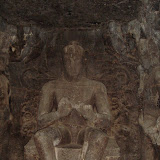In a recent Telugu film Dhada, the comedian Brahmanandam, at a party, goes around the room trying to chat up women - all of them fair skinned - and fails each time. Then, he is approached by a black woman (who I thought was quite pretty), but he rejects her outright, running out of the room to get away from her.
Discrimination within a system is often difficult to recognise as such without outside perspective, and can remain as a matter of fact, unnoticed, until something happens to highlight it. That is not to say that the discrimination stops once it is in the open, only that thought and debate on the issue begin once it is recognised as an issue. For example, discrimination according to caste, while still prevalent, is not something that can happen unnoticed, as a matter of fact, any more. The issue is in the open, and every new instance of discrimination is catalogued, and debated upon.
Discrimination based on colour is not one such an issue in India. It happens everyday, all around us, but nobody pays attention to the fact that discrimination is taking place. This discrimination is not against a particular segment of the population, it does not have an agenda. Unlike elsewhere, it does not factor in the economic or political spheres: people don't lose jobs or elections because they are dark skinned. The negative bias restricts itself to considerations of potential sexual partners.
One possible theory of the origin of this bias goes back to the migration and consequent subjugation of the darker native Indians by the invading fair skinned Aryans - and the later demonisation of the natives by the ruling Aryans. This might have been reinforced by two centuries of British rule: I wonder if while rebelling against foreign rule, Indians developed an inferiority complex which manifests itself as this colour bias. Not to say that Indians desire fair skinned foreigners, no: what they want are fair skinned Indians. Looked at more closely, this discrimination appears not to be a malicious degradation of the other, but a deep dissatisfaction with something within, and an attempt to rid itself of that blemish.
Whatever the reason maybe, it is a widely accepted in India today that fair skin is more desirable than dark skin. I can't seem to recall even one major actress with dark skin, and even those actresses who are somewhere in the middle are touched up on screen to appear as fair as possible. I remember an ad for the fairness cream Fair and Lovely a few years ago, where it is shown that a girl is rejected for marriage because she is too dark, and after using the cream for a few months she becomes much more desirable to prospective grooms. Jokes on screen about the undesirability of dark skinned men are quite common, especially at the expense of comedians - Sunil and Babu Mohan (of the Telugu film industry) come to mind immediately.
As I said earlier, this discrimination, while ubiquitous, has not gained significance as an issue yet. Biases of other kinds, those based on caste or religion or social status are easier to deal with: while it might still be difficult, education and reason can go a long way. But sexual bias - while still socially conditioned - is far more primal, and cannot be combated with reason. It could take generations to reverse it, if it can even be done. As it is though, I am actually worried that we Indians are going to breed the dark skin right out of our genes: quite sad really, given how much healthier dark skin is for the Indian climate.






